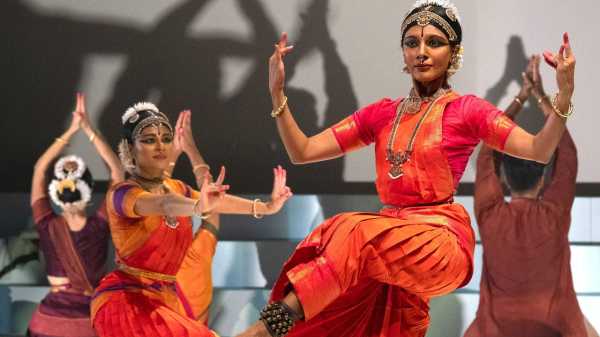
Save this storySave this storySave this storySave this story
Marina Harss
Harss has written about dance for Goings On since 2004.
You’re reading the Goings On newsletter, a guide to what we’re watching, listening to, and doing this week. Sign up to receive it in your in-box.
You can’t miss it. As you approach Lincoln Center, a large metal frame fills the plaza, around which rise three of the center’s stately theatres, homes to ballet, opera, and symphonic music. Above the familiar fountain hangs a ten-foot disco ball. This is the Dance Floor, the centerpiece of Lincoln Center’s “Summer for the City” festival, now in its third year.
The initiative, which fills the gap left by the much lamented Lincoln Center Festival and Mostly Mozart Festival, is of the little-bit-of-everything variety. As Shanta Thake, the center’s chief artistic officer, said recently, “we believe that more is better.” Accordingly, the busy schedule includes almost nightly dance parties on the plaza, along with film screenings, poetry readings, civically minded discussions, augmented-reality experiences, musical performances, and more, spread across the complex’s open and indoor spaces. The vast majority of events are free; select indoor performances are pay-what-you-wish.
In place of the weeks-long Mostly Mozart Festival, the newly named Festival Orchestra, led by the incoming music director Jonathon Heyward, offers seven programs (July 20-Aug. 10), at David Geffen Hall. These contain everything from works by Haydn and Mendelssohn—and some Mozart!—to “City of Floating Sounds,” a tech-driven, interactive symphony by Huang Ruo.
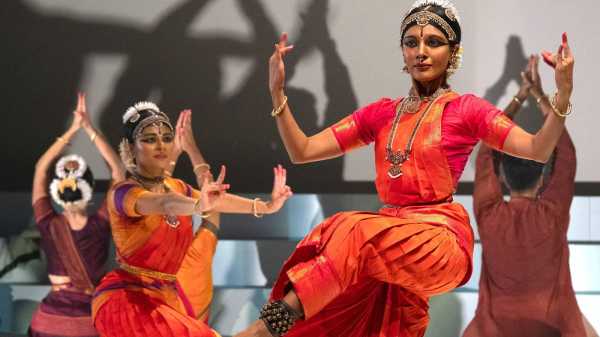
Performers in “Avimukta,” Ashwini Ramaswamy and Aparna Ramaswamy (left to right).
Photograph by Steven Pisano
And there is dance—and not just the participatory kind that goes on under the disco ball. As part of “India Week” (July 10-14), the Minneapolis-based bharata-natyam company Ragamala Dance presents the spare, elegant “Avimukta: Where the Seeker Meets the Sacred,” composed of stylized movements related to rituals of death and mourning (Damrosch Park, July 10). The following two evenings, the British dancer and choreographer Aakash Odedra, a kathak virtuoso, performs a collaboration with the Chinese contemporary dancer Hu Shenyuan, the duet “Samsara” (Rose Theatre, July 11-12). Imagine a fluid, constantly evolving conversation between contrasting movement languages.
Later, Urban Bush Women, based in Brooklyn, presents a site-specific dance-theatre work inspired by African American histories (Hearst Plaza, July 28 and Aug. 4). And the BAAND Together Dance Festival, now mercifully moved to the air-conditioned space of the David H. Koch Theatre, returns (July 30-Aug. 3). Five major New York companies—Ballet Hispánico, Alvin Ailey American Dance Theatre, American Ballet Theatre, New York City Ballet, and Dance Theatre of Harlem—take turns in programs featuring works by William Forsythe, George Balanchine, Hans van Manen, Brady Farrar, and Annabelle Lopez Ochoa. That’s something to look forward to.

About Town
Folk
When the singer-songwriter Cassandra Jenkins was young, her father bought a bus so that their family band could tour little folk festivals across the country. After design school, Jenkins ran the gamut of small-time groups, from surf rock, synth pop, and emo to playing at a honky-tonk bar. In 2019, she was set to join David Berman’s Purple Mountains project on tour when he took his own life, and her breathtaking breakthrough album, “An Overview on Phenomenal Nature,” is possessed by that loss and by the epiphanies produced in tragedy’s wake, channelling its revelations into hushed, observant folk songs. Reinvigorated by the LP’s success, Jenkins seems to fully unclench on her new album, “My Light, My Destroyer,” its wider-ranging sonic palette nodding subtly to a roving musical journey.—Sheldon Pearce (Public Records; July 11.)
Classical
Nothing welcomes you to Tanglewood quite like Beethoven. The first-ever concert of the Massachusetts festival, in August of 1937, was an all-Beethoven program; this summer, the Boston Symphony Orchestra kicks off the season in the same fashion. The opening concert includes the spirited Violin Concerto in D Major, performed by the Grammy winner Gil Shaham, and the epochal “Eroica” Symphony, originally dedicated to Napoleon, before Beethoven came to his senses.—Jane Bua (Tanglewood, Lenox, Mass.; July 5.)
Theatre
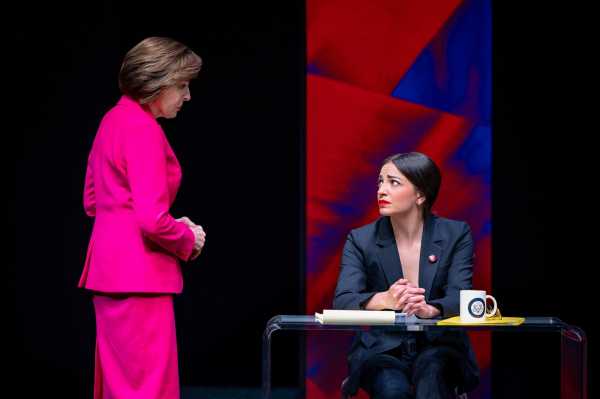
Photograph by Daniel Rader
From the contrast between Nancy Pelosi’s bubble-gum-pink suit and Alexandria Ocasio-Cortez’s black slacks to the slash in its title, “N/A” emphasizes the divide between the first female Speaker of the House (played by Holland Taylor) and the youngest U.S. congresswoman ever elected (a diamond-sharp Ana Villafañe). The playwright, Mario Correa, ably exploits their differences in age, background, and political tactics for zingers, but he confines the pair to repartee for almost the whole show, which spans the four years between A.O.C.’s 2018 Democratic-primary upset and Pelosi’s announcement, after the 2022 midterms, that she would not seek a leadership role in the next Congress. Despite excellent performances and a sleek production (directed by the Tony-winning Diane Paulus), viewers may wish for, as with Congress itself, less talk and more action.—Dan Stahl (Mitzi E. Newhouse; through Aug. 4.)
Dance
The Royal Ballet, from England, and Jacob’s Pillow, in the Berkshires, two august institutions with roots dating to the nineteen-thirties, have never fully intersected until now. To mark the occasion, the Royal is spreading its festival début across both of the Pillow’s stages, indoor and outdoor. The programming, alas, isn’t quite as exciting. The company brings Pam Tanowitz’s new “Secret Things,” not yet seen on these shores, and also a world première by Wayne McGregor, but otherwise it presents samplers heavy on staple solos and pas de deux, clipped from classics for galas and touring. Still, this is the Royal, and the dancers will shine.—Brian Seibert (Jacob’s Pillow Dance Festival, Becket, Mass.; July 3-7.)
Art
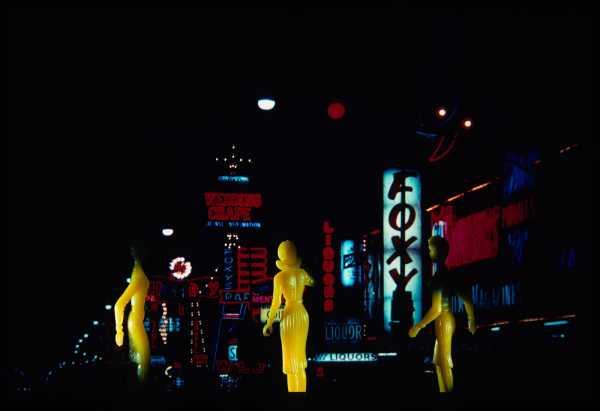
“Tourism: Las Vegas/First View,” 1984.
Art work by Laurie Simmons / Courtesy Paula Cooper Gallery
The beautiful, cool, intellectual, and visual atmosphere that fills the air at the outstanding show “Tabula Rasa” is due to the curator Steven Henry’s deep knowledge and understanding of conceptual art as it relates to photography, and to language. The exhibition takes its title from the late artist Sarah Charlesworth, and her early exploration of the historical value of fact-based images. It’s a wonderful opportunity to see the work of some members of the Pictures Generation—artists who, in the nineteen-seventies, questioned not only art’s “expressiveness” but its very function—and those who came after. Of special note are Joseph Kosuth’s fascinating studies of how text itself is an image, James Welling’s masterly and lyrical dissection of the print, Mike Kelley’s concept of home, Glenn Ligon’s examination of photographic production, and Laurie Simmons’s model who lives in a “Taxi Driver”-inspired world.—Hilton Als (Paula Cooper; through July 26.)
Movies
With her new film, “Last Summer,” the French director Catherine Breillat—whose career, launched in 1976, has been centered on the dangers and pleasures of forbidden desire—displays the destructive furies at the heart of family life. Anne (Léa Drucker), a lawyer and a mother of two young girls who is married to a businessman, has an affair with her seventeen-year-old stepson, Théo (Samuel Kircher). It’s more than a transgression—it’s a crime, and the maneuvers by which Anne fights to save both her marriage and her reputation have a mortal ferocity that the callow yet intrepid Théo, with his own demands and schemes, matches step for step. The movie’s clashes of irresponsible, irreconcilable passions reach a fearsome pitch—yet the terrifying silences of ironclad secrets shriek loudest of all.—Richard Brody (In theatrical release.)

Pick Three
The critic Jennifer Wilson on vacation-gone-wrong novels.
Summer makes me sweat. There is too much pressure to enjoy it. But I realized that the season and all its expectations—softball games, pool parties, trips—grated on me only when I found myself recommending “beach reads” about vacations doomed to disappoint.
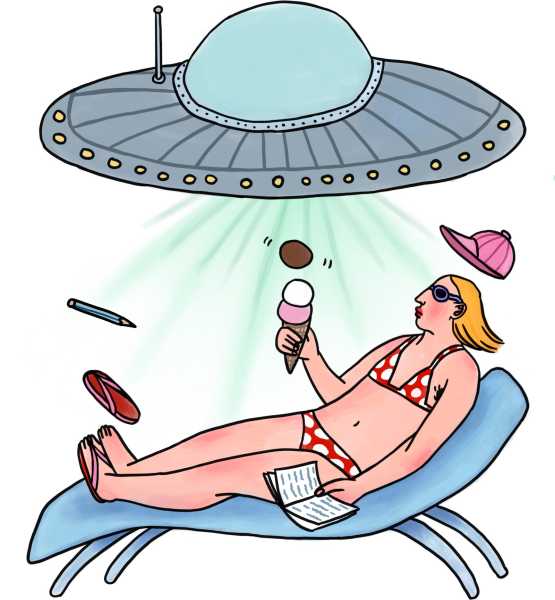
Illustration by Maisie Cowell
1. “The Diver’s Clothes Lie Empty” (2015), by Vendela Vida, begins mid-flight. On a plane to Casablanca, an American is flooded with hot memories of summers past—kissing a boy who smelled of sunscreen on a hammock, an interlude in Dubrovnik. Once in Morocco, though, her wallet and passport are stolen. To anyone hoping that travel will turn them into a new person, this novel warns: Be careful what you wish for.
2. In Katie Kitamura’s “A Separation” (2017), a woman travels, off-season, to Greece to find her estranged husband, like the Odyssey in reverse. These days, men no longer had “a sea to roam,” she thinks. “It was only on the shores of infidelity that they achieved a little privacy, a little inner life”—assuming, that is, he’s still alive.
3. In Marie NDiaye’s “That Time of Year” (2020), a Parisian family lingers in a French resort town after summer is over. It’s just a couple extra days, they think. No harm done, until the morning when the husband finds that his wife and child are missing. All of us have overstayed our welcome at some point, in a place, in a relationship. This novel is at once a social critique about the leisure class and a devastating meditation on why it’s so hard to leave the places (and people) that help us forget who we were before we came to their shores.
P.S. Good stuff on the Internet:
- Tracking a joke from “Golden Girls” to “Glee”
- Chip nation
- A sheep’s sneezes
Sourse: newyorker.com
